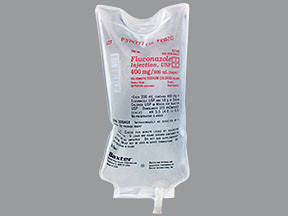FLUCONAZOLE - INJECTION
PHONETIC PRONUNCIATION: (floo-KON-a-zole)
COMMON BRAND NAME(S): Diflucan
GENERIC NAME(S): fluconazole in sodium chloride, iso-osmotic
Uses
USES: Fluconazole is an azole antifungal used to prevent and treat a variety of fungal infections. It works by stopping the growth of fungus.
How to use FLUCONAZOLE - INJECTION
HOW TO USE: This medication is given by injection into a vein as directed by your doctor, usually once daily. Dosage is based on your medical condition and response to treatment. For children, the dosage is also based on weight. If you are giving this medication to yourself at home, learn all preparation and usage instructions from your health care professional. Before using, check this product visually for particles or discoloration. If either is present, do not use the liquid. Learn how to store and discard medical supplies safely. This medication works best when the amount of medicine in your body is kept at a constant level. Therefore, use this drug at evenly spaced intervals. Continue to take this medication until the full prescribed amount is finished, even if symptoms disappear. Stopping the medication too early may result in a return of the infection. Tell your doctor if your condition persists or worsens.
Side Effects
Precautions
Interactions
Overdose
Images
Reviews
Faq for FLUCONAZOLE - INJECTION
- Flucloxacillin is an antibiotic used to treat infections caused by certain bacteria. It is commonly used to treat skin and soft tissue infections, such as cellulitis and impetigo.
- Flucloxacillin is usually given by injection into a vein (intravenous) or muscle (intramuscular). It is generally administered by healthcare professionals in a hospital setting.
- Common side effects may include stomach upset, diarrhea, nausea, vomiting, itching, or rash. More serious side effects like severe allergic reactions or liver problems are rare but possible.
- Flucloxacillin should only be used during pregnancy if the potential benefits outweigh the risks. It is important to discuss with your healthcare provider before using this medication if you are pregnant or planning to become pregnant.
- Flucloxacillin can be used in children, but the dosage may vary based on their age and weight. It is important to follow the specific instructions provided by a healthcare professional.
- The duration of treatment with Flucloxacillin depends on the type and severity of the infection. It is important to complete the full course of treatment prescribed by your doctor, even if you start feeling better.
- If you miss a dose, it is important to contact your healthcare provider for guidance. They will advise you on the best course of action, which may include taking the missed dose as soon as possible or adjusting the schedule.
- Flucloxacillin may interact with certain medications, such as oral contraceptives, anticoagulants, and methotrexate. It is important to inform your healthcare provider about all the medications you are taking to avoid potential interactions.
- Drinking alcohol while taking Flucloxacillin is generally not recommended. Alcohol can increase the risk of certain side effects and may interfere with the effectiveness of the medication.
Disclaimer
IMPORTANT: HOW TO USE THIS INFORMATION: This is a summary and does NOT have all possible information about this product. This information does not assure that this product is safe, effective, or appropriate for you. This information is not individual medical advice and does not substitute for the advice of your health care professional. Always ask your health care professional for complete information about this product and your specific health needs.



No Reviews Yet